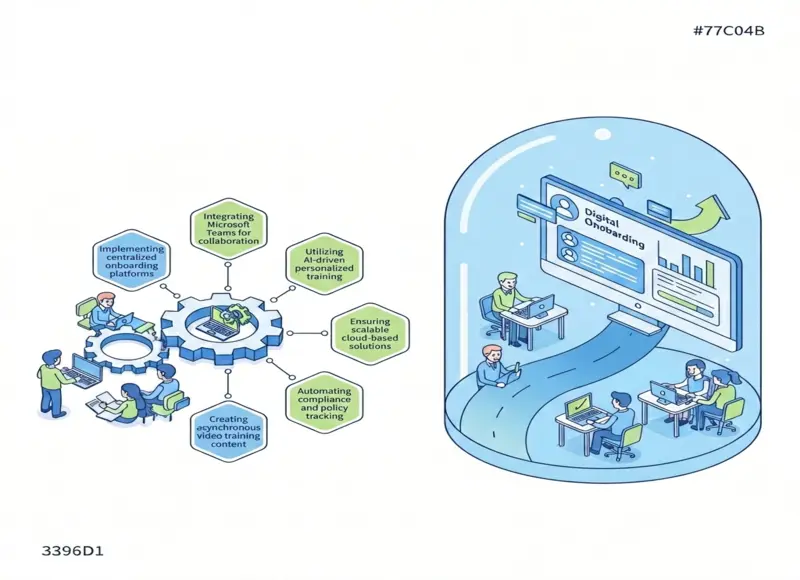Table of Contents
Gain a comprehensive understanding of the role of a marketing platform in modern marketing. Explore its benefits and how it revolutionizes marketing strategies.

You run a business that you're committed to making succeed. You've got your work cut out for you. There's a website to design, you've got social media content to create and schedule, a few blog posts and email newsletters to write, etc.
Ideally, this would mean getting a tool for each of these projects. That's expensive and as impractical as a camel in the Arctic. Thankfully, marketing platforms now exist to take this weight off your shoulders.
What's A Marketing Platform?
A marketing platform is an all-in-one toolbox. Its purpose is simple and to the point: to streamline and manage all your marketing activities, from creation to measurement, in one place.
Say you've got that bakery down the street to let everyone who loves cake know about it. You can use your marketing platform to create recipe videos they'll not forget soon.
But that's not all. You can also schedule eye-catching social media posts announcing your newest treats to the cake world. You can even design targeted email campaigns to announce special offers to your loyal customers.
This doesn't even scratch the surface of what the right all-in-one marketing platform can do for your business. Think about building landing pages, managing your tribe, simplifying the checkout process, etc.
There are so many marketing platforms out there. Each has its highlight reels and weaknesses, of course. But which is best depends on your specific needs and budget. Look around and settle for the choicest one without breaking the bank.
Remember: Marketing platforms are designed to be user-friendly. So, even if you're not a tech bro, you can get started quickly and leverage your power to create impactful marketing campaigns.
How Do Marketing Platforms Feature in Modern Marketing?
Here's how the lifesavers announce their presence in marketing in the 21st century:
Content Creation & Management
Gone are the days of cobbling together content from different sources. Marketing platforms offer a one-stop shop for creating and managing all your marketing content. Here's what you can expect:
Content Creation Tools
Many platforms offer built-in tools for designing social media graphics, crafting email newsletters, or creating landing pages with drag-and-drop functionality.
Content Calendar & Scheduling
Organize your content strategy with a centralized calendar. Schedule posts and campaigns in advance. No more inconsistent flow of content across various channels.
Collaboration Features
Work together with your team. Some platforms allow seamless collaboration on content projects, making feedback and edits a breeze.
Social Media Management
A business not on social media today is hanging off the ledge. That's literally where five billion people are. And do you know what's just as bad? A business that's on only one social media platform. Time constraints, maybe? A lean team? That's something marketing platforms can help you fix.
Here's how they streamline your social media presence:
Multi-Platform Publishing
Effortlessly publish content across platforms like Facebook, Instagram, and X, all from a single interface.
Scheduling & Automation
Schedule posts in advance and automate repetitive tasks like publishing evergreen content. This frees you up to focus on real-time engagement. If you’re looking to streamline your Pinterest marketing, consider a free Pinterest scheduler that allows you to plan and schedule pins ahead of time effortlessly.
Social Listening & Analytics
Track brand mentions, measure engagement metrics, and gain valuable insights into your audience's behavior. Use this data to refine your social media strategy for better results.
To understand what resonates, look into follower growth, engagement rates, and click-throughs. Then, tailor your content accordingly.
Targeting & Personalization
Marketing to everyone is marketing to no one. That's business advice that has aged like good old Tuscany wine. You've got to know your target audience and how to look them in the eye and convince them to buy your products or services.
Here's how marketing platforms help with that:
Audience Segmentation
Divide your audience into distinct groups based on demographics, interests, or behavior. This allows you to tailor your marketing messages for maximum impact.
Personalized Content
Come up with targeted messages that resonate with each audience segment. Think personalized email greetings, social media ads showcasing products relevant to their interests, or website content tailored to their needs.
Advanced Targeting Options
Many platforms offer sophisticated targeting options. You can use website tracking to retarget website visitors or a social media platform's advanced targeting tools to reach highly specific demographics.
Powerful Analytics
Making decisions in the dark is a risky move in marketing, and it's not one you should typically tempt fate with. That's why you've got to take advantage of the analytics tools that come with your marketing platform.
Here's what you gain:
Campaign Performance Tracking
Track key metrics like website traffic, conversion rates, and social media engagement for each campaign.
Data Visualization
See your data presented in easy-to-understand charts and graphs. This can allow you to identify trends and measure success quickly.
Attribution Modeling
Understand which marketing channels are driving the most results. This empowers you to optimize your budget and focus on the channels delivering the highest ROI.
Target the right people and see what's working (and what's not). This way, your marketing platform goes from content-central to a strategic decision-making machine. The result is that marketing efforts are laser-focused and deliver measurable results.
Streamlined Workflows & Collaboration
Marketing platforms help streamline workflows and foster seamless collaboration. Here's how:
Project Management Tools
Organize your marketing projects with built-in task management features, assign deadlines, and track progress efficiently by using project management software.
Team Collaboration
Facilitate seamless collaboration between team members. Share files, provide feedback, and keep everyone on the same page within the platform.
Approval Workflows
Establish clear approval workflows for marketing materials. Ensure brand consistency and avoid last-minute revisions with a streamlined approval process.
Automation & Efficiency
Marketing platforms are time-savers. They offer a variety of automation features to free up your valuable time:
Email Marketing Automation
Schedule automated email sequences based on user behavior. Is a new subscriber just coming on board? How about a welcome series email? Does someone still need to complete their purchase? Think about firing abandoned cart reminders their way. In addition, to ensure your emails reach the right recipients, an email verifier can help maintain a clean list by removing invalid or inactive email addresses.
Social Media Scheduling
Schedule social media posts in advance for the entire week or month. This saves you time and ensures consistent brand presence.
Reporting Automation
Generate automated reports on key marketing metrics. This way, you stay informed without manual data crunching.
Integrations
Marketing platforms aren't islands. They play nicely with others. Integrations allow you to connect your marketing platform with various other tools you use. The result is a unified marketing ecosystem.
Here are a few integrations that can happen:
CRM Integration
Sync customer data between your marketing platform and your CRM (Customer Relationship Management) system. This ensures all customer interactions are tracked and allows for more personalized marketing campaigns.
Ecommerce Integration
Connect your marketing platform with your online store. This lets you track website traffic, analyze customer behavior, and personalize product recommendations.
Analytics Integration
Integrate your marketing platform with analytics tools like Google Analytics for even deeper insights into your marketing performance.
In Practice
You're running a restaurant chain. There are a lot of things to do at any one time. With a CRM integration, you can track customer loyalty points and send targeted birthday promotions.
You can also connect with your online ordering system to personalize email marketing campaigns based on past purchases. At the end of the campaign, you can use the integrated Google Analytics to understand which marketing efforts drive the most website traffic and online orders.
Scalability & Growth
You have lofty dreams of seeing your business hit the million, multi-million, or even the multi-billion mark. Why not? So, when you settle for a marketing platform, make sure it scales with you.
This is what you should give the number one priority:
Flexible Features
Many platforms offer tiered plans with varying levels of functionality. Choose a plan that accommodates your current needs but has the potential to grow with your business.
Advanced Features for Growing Businesses
As your business matures, your marketing platform can offer advanced features like lead scoring, marketing attribution modeling, and more sophisticated analytics.
Integrations for a Winning Ecosystem
Integrating various marketing tools allows you to build a robust marketing ecosystem supporting your evolving needs.
In Practice
You're a fitness startup with a particular interest in fitness classes online. As more and more people flock to your classes, your marketing platform can help you:
- Upgrade your plan to include features like email marketing automation to nurture leads and convert them into paying customers.
- Leverage lead scoring to identify your most qualified leads and prioritize your sales efforts.
- Integrate with a webinar platform to host online fitness classes and reach a wider audience.
Put, your marketing platform is a long-term partner in your marketing success story.
In Closing
A marketing platform can indeed change the game for your business. This guide has introduced to what it can do. If you feel intrigued, why not try it out in your business?
Make sure whatever you settle for fits your business like a glove and is within your budget. The right platform can make all the difference.








